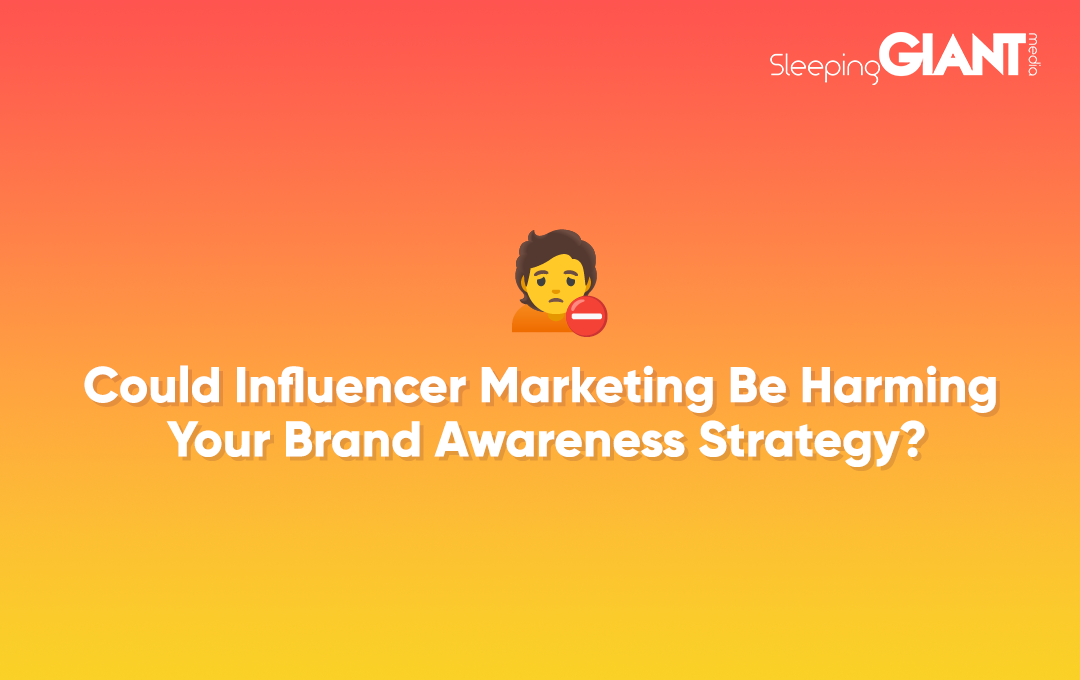
Could Influencer Marketing be Harming Your Brand Awareness Strategy?
Did you know that influencer marketing can be traced back to ancient Roman times when gladiators endorsed products? We didn’t either. Fast-forward a few thousand years and this form of marketing is still taking the world by storm, particularly in digital spaces within the last five years. Whether you are a fan and avid consumer of influencer content or not, it’s hard to deny that influencer marketing has paved the way for some major brand successes.
That being said, it hasn’t always been an easy journey for brands to navigate. Let’s take a deep dive into what the implications of influencer marketing could be for your brand awareness strategy.
Why have brands turned to influencer marketing?
You might be thinking, why influencer marketing? Well, the brands that have utilised this tool have seen some fantastic results. Gymshark, Glossier, and HelloFresh are just a few examples of the success stories seen with influencer marketing. Let’s take a look at some of the key reasons why it’s worked.
Community and engagement
Working with influencers has several advantages, primarily that they come with an engaged community of followers. Brands being able to leverage an influencer’s community can give them the opportunity to reach new audiences, build trust and receive feedback on products and services.
Authenticity
Working with an influencer who is authentic and aligns with your brand can promote trust and credibility with your existing and potential audience —and this can add significant value to your brand awareness strategy.
Cost-effectiveness
An added bonus for brands is that influencer marketing is relatively cost-effective in comparison to other digital marketing methods. In fact, 44% of marketers say that the biggest benefit of working with small influencers is that it is less expensive. The ROI of this marketing type can also be high, so it’s understandable why brands have jumped at the chance to work with influencers in recent years.
Can influencer marketing be harmful?
When it works, influencer marketing can produce great results for brand awareness. However, when it doesn’t, businesses run the risk of harming their brand and reputation, which could take months, or even years, to rebuild. Here are some of the key issues to consider when entering a partnership with an influencer.
Inauthentic partnerships
We mentioned how partnering with an authentic influencer can build strong brand awareness, but what if we flipped the coin? Consumers and audiences can quickly determine if a partnership doesn’t feel right or doesn’t align. Maybe the influencer is promoting a product they don’t truly believe in. Not only can it be damaging to the influencer’s brand and the community they have built, but it can also cause credibility issues for the company.
Choosing influencers with big followings
It’s easy to think that partnering with an influencer with a huge following will bring fantastic results for your brand awareness strategy. However, this isn’t always the case and there are a number of factors why. Perhaps the target audience doesn’t align with your brand, or maybe the influencer hasn’t spent time to create an engaged community. Whatever the reason, choosing an influencer based on the number of followers they have can be detrimental to a company’s brand awareness and reputation if the partnership doesn’t work.
Morality issues
Everyone makes mistakes… but when it’s an influencer that makes a mistake, this can cause a fair few issues for the brand partnering with them. There have been a number of instances where influencers have made poor decisions (anyone remember #MascaraGate on TikTok?). Whilst this only caused minor havoc to the influencer and brand’s reputation for a few months, this isn’t always the case and businesses need to consider the risk of partnering with an influencer who is, essentially, only human.
De-influencing
The previous example leads nicely onto our next point – ‘de-influencing’. Yes, the opposite of influencing, a trend that rose in popularity following the mascara debacle last year. In essence, de-influencing is a trend where social media creators and influencers have started to tell their audiences why they actually shouldn’t purchase a particular product. Why? 1. To discourage consumers from overbuying, and 2. To build trust and authenticity with their community.
Why could this be harmful to brands? Well, the positioning of de-influencing revolving around avoiding overconsumption of material things might mean that brands shouldn’t necessarily rely on influencer marketing to build brand awareness. Having said this, we believe it means that brands need to be careful that they are forming relationships with influencers that are authentic and honest and can bring value to the brand awareness strategy. Trust is, ultimately, the aim of the game.
So, could influencer marketing be harming your brand awareness strategy? If done badly, then yes. But if a company partners with an influencer that aligns with their values and target audience, and brings authenticity and trustworthiness, then influencer marketing can harness fantastic results and ROI.
Need help with your social media strategy?
Learn more about social media marketing through our social media how-to’s. If you would like to take your social media strategy to the next level, get in touch with our Creative Team today. Or, for more tips and tricks, keep up with our blog.
Blog
Everything you Need to Know About the March Core Update
We knew it wouldn’t be long before Google released their first core update of...
Giant Wednesday
How To Optimise Images For Websites
Digital Marketing, technology & business insights, how-to's and explainer...
Follow Us
Sign Up For More
Stay up to date with the latest happenings, learnings, events & more with our GIANT Newsletters.
Contact Us
Top Floor, The Civic Centre, Castle Hill Avenue, Folkestone CT20 2QY.




